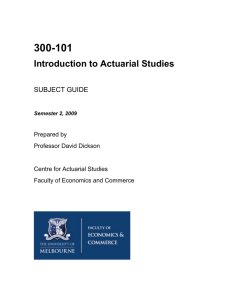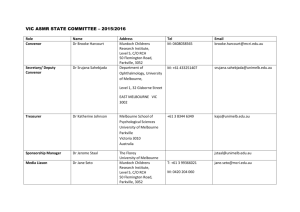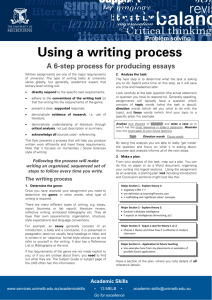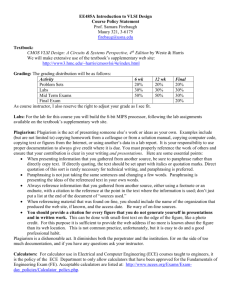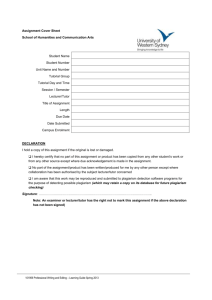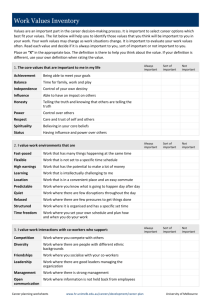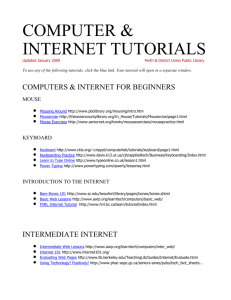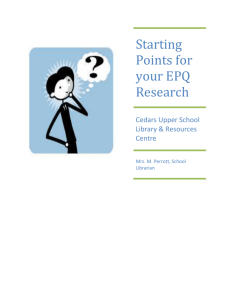Subject Guide - University of Melbourne
advertisement
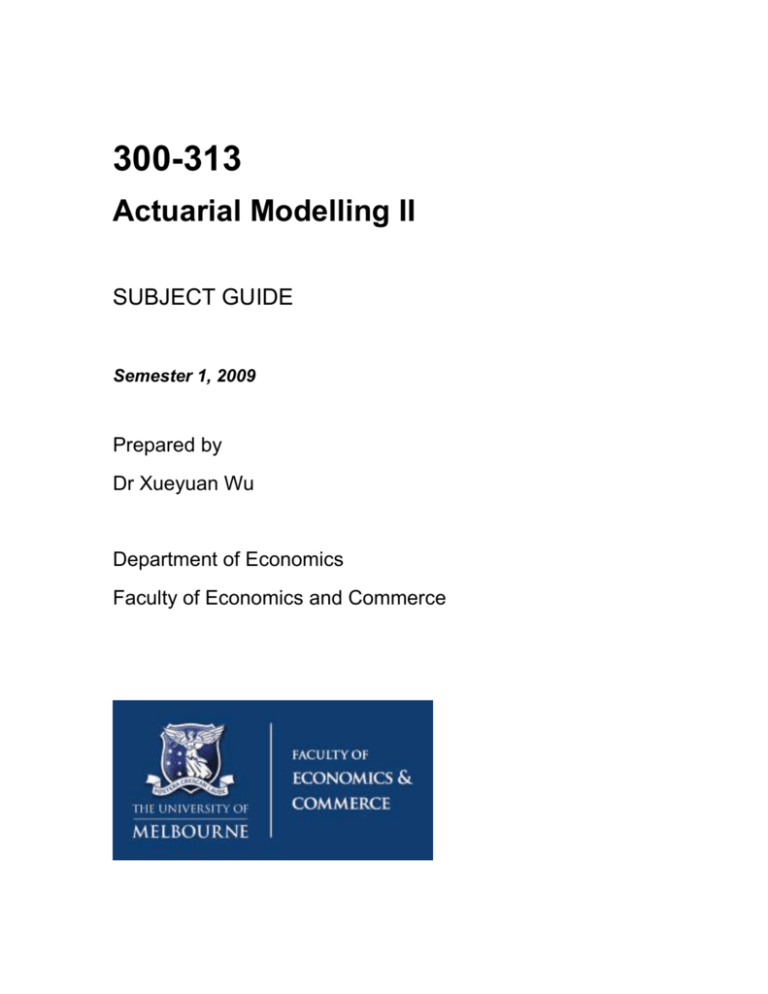
300-313 Actuarial Modelling II SUBJECT GUIDE Semester 1, 2009 Prepared by Dr Xueyuan Wu Department of Economics Faculty of Economics and Commerce Contents CONTENTS .................................................................................................................................................................2 SUBJECT OUTLINE ..................................................................................................................................................3 INTRODUCTION ..........................................................................................................................................................3 SUBJECT AIMS ...........................................................................................................................................................3 PRESCRIBED REFERENCES .........................................................................................................................................3 LEARNING OUTCOMES .........................................................................................................................................3 SUBJECT OBJECTIVES ................................................................................................................................................3 GENERIC SKILLS ........................................................................................................................................................3 PREREQUISITES .......................................................................................................................................................4 ACADEMIC STAFF CONTACT DETAILS ............................................................................................................4 SUBJECT COORDINATOR CONTACT DETAILS .............................................................................................................4 TUTOR CONTACT DETAILS ........................................................................................................................................4 EMAIL PROTOCOL......................................................................................................................................................4 LECTURES AND TUTORIALS ................................................................................................................................4 LECTURE TIMES.........................................................................................................................................................4 LECTURE SLIDES .......................................................................................................................................................5 TUTORIAL TIMES .......................................................................................................................................................5 ENROLLING IN TUTORIALS USING ALLOC8 ...............................................................................................................5 ASSESSMENT .............................................................................................................................................................5 ASSESSMENT OVERVIEW ...........................................................................................................................................5 EXAM POLICY ............................................................................................................................................................6 USING THE ASSIGNMENT TOOL .................................................................................................................................6 PLAGIARISM AND COLLUSION ...................................................................................................................................7 SPECIAL CONSIDERATION ..........................................................................................................................................7 GROUP WORK............................................................................................................................................................7 OTHER SUBJECT RESOURCES.............................................................................................................................8 NON-ASSESSABLE CLASS TESTS ................................................................................................................................8 TEACHING & LEARNING UNIT ...................................................................................................................................8 OTHER INFORMATION ..........................................................................................................................................9 CREDIT FOR PROFESSIONAL EXAMINATIONS ..............................................................................................................9 COMPUTERS AND CALCULATORS ..............................................................................................................................9 2 Subject Outline Introduction Welcome to 300-313 Actuarial Modelling II. This is a 12.5 point subject, with two lecture hours and one tutorial hour per week. The subject will be reasonably intensive and you are advised that you must keep up-to-date with work. In particular, you should complete tutorial questions on a weekly basis and make a genuine attempt at all parts of the assessment. Students who perform at a suitably high level in the end of semester exams in both this subject and subject 300-312, Actuarial Modelling I, will be recommended for exemption from the professional subject of the Institute of Actuaries of Australia, CT4 Models. Subject Aims The overall aim of this subject is to provide a grounding in a variety of topics include exact and census methods for estimating transition intensities based on age; goodness of fit and smoothness of graduated estimates versus crude estimates; actuarial modelling; general principles of stochastic processes, and Markov chains in actuarial work. Prescribed References Kostya Borovkov, 2003. Elements of Stochastic Modelling. World Scientific, New JerseySingapore: xiv+342 pp. Learning Outcomes Subject Objectives To view the subject objectives and the generic skills you will develop through successful completion of this subject, please see the University Handbook: https://app.portal.unimelb.edu.au/CSCApplication/view/2009/300-313 To view the learning goals, generic skills and graduate attributes for your degree, please locate the University Handbook entry for your degree at: http://handbook.unimelb.edu.au/ Generic Skills In this subject you will have the opportunity to develop important generic skills. These include: written communication; problem solving; statistical reasoning; application of theory to practice; synthesis of data and other information. 3 Prerequisites 300-204 Financial Mathematics II and 620-202 Statistics. Academic Staff Contact Details Subject Coordinator Contact Details Your coordinator for 300-313 Actuarial Modelling II is Dr Xueyuan Wu. Email: xueyuanw@unimelb.edu.au Room: Room 531, Economics & Commerce Building Phone: 83447939 Tutor Contact Details See the “Staff Information” section of the LMS subject page of 300-313. Email Protocol Please note that we are only able to respond to student emails coming from a University email address. Please do not use personal email addresses such as Yahoo, Hotmail or even business email addresses. Emails from non-University email addresses may be filtered by the University’s spam filter, which means that we may not receive your email. All correspondence relating to this subject will only be sent to your University email address. Note that you must first activate your University email address before you can send or receive emails at that address. You can activate your email account at this link: http://accounts.unimelb.edu.au/. While academic staff endeavor to address queries received via email, it is more appropriate to resolve substantive questions during lectures and tutorials and during normal consultation hours. With this in mind, we encourage students to attend all lectures and tutorials and to familiarise themselves with the consultation hours offered by the lecturers and tutors in this subject. Lectures and Tutorials Lecture Times Monday 12pm: Old Arts-Theatre D Wednesday 12pm : Old Geology-Theatre 1 Friday 12pm : (WEEK ONE ONLY) Old Geology-Theatre 1 4 Lecture Slides Lecture slides will be placed on the LMS page for this subject following to each lecture. The lecture slides are located under the heading “Lectures”. Tutorial Times T01/01 Wednesday 10:00am - 11:00am Old Arts-239A T01/02 Wednesday 1:15pm - 2:15pm Old Arts-262 T01/03 Monday 2:15pm - 3:15pm Old Arts-262 T01/04 Friday 9:00am - 10:00am Old Arts-262 T01/05 Friday 2:15pm - 3:15pm Old Arts-262 T01/06 Wednesday 3:15pm - 4:15pm Arts Centre-403 Tutorials for this subject will commence in week 2. Enrolling in Tutorials Using Alloc8 Alloc8 is the University’s online tutorial allocation system. You must enrol in a tutorial for this subject using Alloc8 as soon as possible. Late enrolment into tutorials is handled by the Commerce Student Centre (Ground Level, Babel Building). More information about Alloc8, including cut-off dates and a link to the login page, can be found on the Faculty’s website: http://www.ecom.unimelb.edu.au/students/undergrad/alloc.html Assessment Assessment Overview Your assessment for this subject comprises the following: Assessment Task Individual or Group Due Weighting Assignment 1 Group April 23 2009 10% Assignment 2 Group May 21 2009 10% End-of-semester exam n/a Assessment period 80% Assignments Questions for each assignment will be available in the LMS under “Assessments” at least three weeks before the corresponding due date. There is also a coversheet for each assignment. 5 Both assignments should be submitted in hardcopy form to the Commerce Students’ Centre, Level 1 of “The Spot”, 198 Berkeley Street. Type up all your answers (and student number and name) and print them out. Neat handwriting is also acceptable. Your pages should be single sided and stapled together. You should also staple the cover sheet to the front of your submission. These are group assignments which are to be completed in groups of two to five students. Collaboration is to be restricted to members of your group. End-of-semester exam This is a two-hour closed-book exam. The reading time is 15 minutes. The exam contributes 80% to the overall assessment in this subject. Electronic calculators may be used. However, only basic scientific calculators are permitted. Also, calculators that have been tampered with since manufacture are prohibited. It is the responsibility of the student to ensure any calculator they use complies with University requirements. Exam Policy The Faculty requires that you are available for the entire examination period. Supplementary exams will not be provided in cases of absence during the examination period, unless the absence is due to serious illness or other serious circumstances. See the Special Consideration web site for more information: http://www.ecom.unimelb.edu.au/students/special/#missing The examination period for this semester is 8-26 June 2009. Using the Assignment Tool During the course of the semester, you’ll be asked to submit one or more assignments in hard copy format at the Commerce Student Centre. When submitting an assignment in hard copy, you must first print out an assignment cover sheet via the Assignment Tool, then complete the cover sheet and attach it to your assignment before you hand it into the Commerce Student Centre. A student guide has been prepared on the use of the Assignment Tool. The guide provides instructions on how to submit individual assignments, how to form groups and submit group assignments. The guide can be downloaded here: http://tlu.ecom.unimelb.edu.au/pdfs/StudentsGuideAssignmentTool.pdf Please note that you are required to keep a copy of your assignment after it has been submitted, as you must be able to produce a copy of your assignment at the request of your tutor or lecturer at anytime after the submission due date. 6 Plagiarism and Collusion Presenting material from other sources without full acknowledgement (referred to as plagiarism) is heavily penalised. Penalties for plagiarism can include a mark of zero for the piece of assessment or a fail grade for the subject. Plagiarism is the presentation by a student of an assignment identified as his or her own work even though it has been copied in whole or in part from another student’s work, or from any other source (eg. published books, web-based materials or periodicals), without due acknowledgement in the text. Collusion is the presentation by a student of an assignment as his or her own work when it is, in fact, the result (in whole or in part) of unauthorised collaboration with another person or persons. Both the student presenting the assignment and the student(s) willingly supplying unauthorised material are considered participants in the act of academic misconduct. See http://www.services.unimelb.edu.au/plagiarism/plagiarism.html for more information. The Teaching and Learning Unit has developed a web-based ‘Academic Honesty Module’ that allows you to learn more about and test your knowledge of plagiarism and collusion. You are strongly encouraged to complete this module, which can be accessed at: http://tlu.ecom.unimelb.edu.au/AcademicHonestyTest/index.cfm Special Consideration Students who have been significantly affected by illness or other serious circumstances during the semester may be eligible to apply for Special Consideration. The following website contains detailed information relating to who can apply for Special Consideration and the process for making an application: http://www.ecom.unimelb.edu.au/students/special/ Group Work Working in groups can sometimes be more difficult than working individually. However, team-work and organisational skills associated with group work are highly valued by employers. With careful management and ongoing communication, you can have a successful and rewarding experience working in a team. You should exchange names, phone numbers, and email addresses with your group members straight away. If you have difficulty with a member of your group, you should contact your lecturer as soon as possible. Do not leave issues unresolved until just before or after your group assignment is due. All students within your group will be given the same mark unless you have raised an issue during the assignment period. Students who do not contribute to a group assignment may be allocated a lower mark or assigned a mark of zero. 7 Other Subject Resources The following resources are provided to assist your learning: If you need assistance during the semester, you have several options: Lecturer Consultations Dr Wu: Wednesdays: 2pm – 4pm, Room 531, Economics & Commerce Building Specimen Exam and Practical Exercises Weekly tutorial exercises and two specimen exam papers are included in the workbook. Solutions for the tutorial exercises will be made available in the LMS. The solutions for the specimen exam papers will be available at the end of the semester. Non-assessable Class Tests In order to provide you with feedback on your progress throughout the subject, we will have three optional class tests held in Weeks 5, 8 and 11. These will most likely be held on Fridays at 12pm in the Old Geology-Theatre 1, however a formal announcement regarding the time and venue of these tests will be made in lectures and on the LMS page. The tests will NOT count towards your assessment in this subject. I will however mark each test that is submitted and provide you with comments on areas where you should spend more time. Detailed solutions to each test along with a marking guide will be provided. Teaching & Learning Unit The Teaching and Learning Unit offers a wide range of support services to students. If you are having any difficulty in studying for this subject you could arrange a consultation with the Unit’s learning skills specialist. The learning skills specialist can review your current approaches to study and offer advice on how to adjust to the demands of tertiary study. If you are a student from a non-English speaking background there is an English as a Second Language specialist who is available to help with your written work. Both of these specialists are available for face-to-face consultations or electronically through email. Go to the Faculty office to arrange for consultations or contact the specialists electronically through the Teaching and Learning Unit web page. The web page also contains a wide variety of study skills topics and information sheets for students, and a timetable of up-coming events, including focussed workshops, designed to support Economics and Commerce students in their study. The Teaching and Learning Unit is located on levels 4 and 6 of "The Spot", 198 Berkeley Street. Please visit the TLU’s website – http://tlu.ecom.unimelb.edu.au/. Make use of the Teaching and Learning Unit. It is there to help. 8 Other Information Credit for professional examinations University of Melbourne students seeking exemption from corresponding examinations of the Institute of Actuaries of Australia should note that performance in assignments is not taken into account. Students who perform at a suitably high level in the end of semester exams in both this subject and subject 300-312, Actuarial Modelling I, will be recommended for exemption from the professional subject of the Institute of Actuaries of Australia, CT4 Models. Computers and Calculators Some assignment questions may require the use of MS Excel. Students may use personal PCs with this package installed or on-campus facilities. Only basic scientific calculators are permitted in examinations. Calculators that can be programmed to store or retrieve text or formulas are not allowed in examinations. Calculators with built in financial functions and calculators which have been tampered with since manufacture are also prohibited. 9
